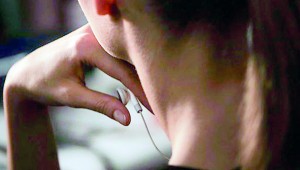Sunday Times 2
Many teens have permanent ringing in the ears
View(s):NEW YORK (Reuters Health) – One in five high schoolers has permanent ringing in the ears, and few take measures to protect their ears from loud music, according to a new study.
Those numbers are surprisingly similar to results of a study of college-aged adults, said lead author Annick Gilles, a clinical audiologist at Antwerp University Hospital in Edegem, Belgium.

Many young people listen to music that is too loud for too long on headphones (AFP)
She and her coauthors had expected the numbers to be higher for college-aged people, who “go out a lot,” she told Reuters Health.
Tinnitus, or ringing in the ears, caused by loud noise exposure is clearly linked to hearing damage, she said. People with permanent ringing in the ears may be able to hear the same volumes of sound as before the damage, but often have trouble separating speech sounds out of a mix of noises.
For the new study, almost 4,000 Flemish high school students completed a questionnaire about temporary and permanent ringing in the ears, also answering questions about their attitudes toward loud noises and hearing protection.
Three out of four kids experienced temporary tinnitus, and one in five heard ringing all the time. Only five percent of the kids said they used any kind of hearing protection against loud noise, such as ear plugs, according to results in the journal PLOS ONE.
“Tinnitus on its own can be very troublesome and have dramatic effects on individuals,” said hearing researcher Dr. Josef Shargorodsky, a fellow at Johns Hopkins Medicine in Baltimore. “Many of the teens in this study likely also have associated hearing loss, which really exacerbates the problem.” About 20 percent of people with tinnitus find it bothersome enough to seek medical help, said Brian Fligor, a pediatric audiologist from Harvard Medical School in Boston.
“Bothersome tinnitus interferes with sleep, concentration, communication, and ability to relax,” said Fligor, who was not involved with the study.
“In short, in a teenager it means they will fall way behind academically, might miss a lot of school, repeat grades, etc. This of course has huge implications for future college and employment opportunities,” he told Reuters Health in an email. Using the widespread cases of tinnitus among kids as a warning sign for future hearing loss could be a good strategy, said Dr. Roland Eavey, an ear, nose and throat specialist at Vanderbilt University in Nashville, Tennessee, who also didn’t participate in the research.”Perhaps that might be like warning smokers to heed the cough before lung cancer is found,” Eavey told Reuters Health.
“Hearing loss from noise used to be from external sources such as loud industry and the military,” he said. “Nowadays the loud volume is from self-inflicted sources such as personal listening devices.”
Gilles said there is treatment for noise trauma that results in hearing loss and tinnitus – including steroids or hyperbaric oxygen chambers – but after a few days, the damage cannot be reversed.
“It is always a very good idea to use hearing protection in noisy situations such as concerts, festivals (and) parties,” Gilles said. “In addition, the use of personal listening devices should be more carefully controlled.” Many young people listen to music that is too loud for too long on headphones, she said.
“Parents should check that their kids are listening to music at reasonable volumes, and use hearing protection in loud environments,” Shargorodsky, who wasn’t part of the study team, told Reuters Health.
Kids who say they hear ringing should be tested for hearing loss, since the two often go together, he added.
“There is no cure for tinnitus or hearing loss, but physicians can guide the families to help deal with the problems depending on the severity,” he said.
Follow @timesonlinelk
comments powered by Disqus

